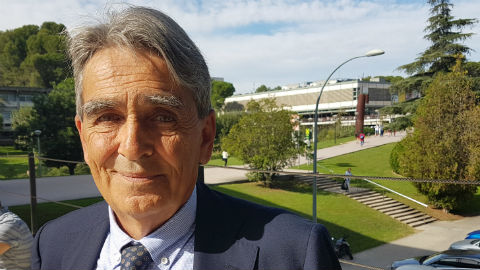"Many people no longer believe in politics, but neither do they believe in many other things"

09/10/2019
-What purpose does politics have or should it have?
-Politics is the ability to solve collective problems. Some politics are just rules or regulations. Others refer to public services such as schools, hospitals, firefighters, etc. But both types must be managed. There are problems, the majority of them, that cannot be solved only through rules or organisations, but need the collaboration and cooperation of differnt public and private actors, as is the case of climate change, immigration, etc. And the political analysis must help in that, in solving complex and varied problems with the aim of reaching an objective which improves the progress of society.
-It seems to be that in Europe people believe less and less in politics. This discredit of politics has come to stay or is it only temporary and characteristic of some Mediterranean countries?
-Well, politics is also being discredited in the United States. There is a general feeling of not believing in politics. Before the end of the 1980s, European politics were dominated by ideologies (Christian democracy, communism, etc.). Later this faded out and practically no ideology remains. People do not believe in politics because they do not believe in many things Take a look at religion, for example. People vote less and less. In Portugal, for example, 90% of the population voted, but now in these last elections some 40% voted. And there is fierce competition between parties. Populist parties propose miraculous solutions, and then do not deliver, and this causes people to no longer trust them. The same happens with Brexit and the whole process.
-What can be done when politicians cannot reach an agreement and everything come to a standstill? Is it the responsibility of society to react? What is your opinion on “civil disobedience”?
-Civil disobedience was invented by Gandhi to achieve a very specific objective, the independence of India.
Currently, politics is a very complicated issue. There are experts, mediators, associations, NGOs, etc. We have many different identities. The average citizen no longer exists. We are all different and have different needs. And each identity has a different way of expressing itself and needs different solutions. It can be compared to a city, with many existing needs: urban organisation, the environment, police, schools, etc. What I want to express is that there a need for collaboration and the ability to find specific solutions to concrete problems. And civil disobedience is negative per se, it goes against this collaboration. Our society needs to work towards positive outcomes, not negative ones.
-What can politics do about the “problem” of immigration in Europe? Is there a solution? Should this represent a unique opportunity for Europe's political systems to work together or is this the proof that in Europe each country to its own?
-We must distinguish two aspects within this field of migrating people: first, war refugees from Lebanon or Jordan, who seek to reach countries they can work in, such as Germany and France. Second, the demographic pressure from places such as Africa, which is growing, and the fact that Spain, Italy and Malta are receiving these people, although what they want is to go to the countries in northern Europe. We should accept them, but the countries do not want them.
Treating a problem by only looking at one of its side is a mistake because there are different perspectives which must be taken into account. In Milan, there are Latin American “ganster” gangs fighting amongst themselves, This problem must be solved differently than, say, Filipino women who work caring for the elderly (In the Lombardy region of Italy alone there are 100,000!). If they were not here, who would be caring for the elderly in Italy? Or in Great Britain, where doctors from Pakistan and India can be found in many hospitals and are essential. Portugal needs workers because it has a demographic problem, as does Canada, where the government is taking actions to bring migrants to Canada. It is all much more complicated than what is explained in the news.
-Corruption is the problem of politics in countries such as Italy and Spain, or is it only an intrinsic part of these political systems which does not exist in northern European countries?
-Yes, it is probably a Latin, Asian and African problem. It is something related to culture. But I believe that in some coutries there has been a loss of hope in progress, and people think that the only way to earn money is by stealing. In other words, the problem for me is not in related to laws, but to make people understand that collaboration and cooperation is better than personal gain. Italy today probably has less corruption than 30 years ago. But there is still the idea that you will be treated better if you know people in the right places.
-How do you see the proliferation of populist parties in the capitals of some of the European Union member states?
-This is what I said at the beginning, that people no longer have an ideology and are not interested in politics. These parties promise the impossible, such as Brexit and similar issues. In Italy they are promising a universal salary. This is impossible! They propose simple solutions to complex problems and of course these later cannot prosper.